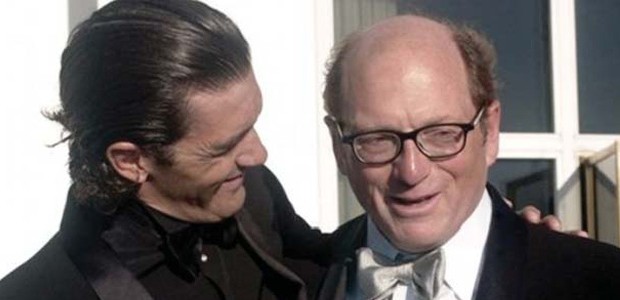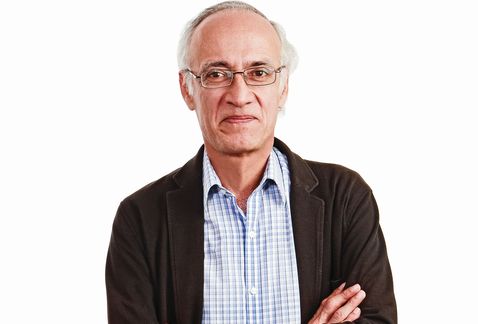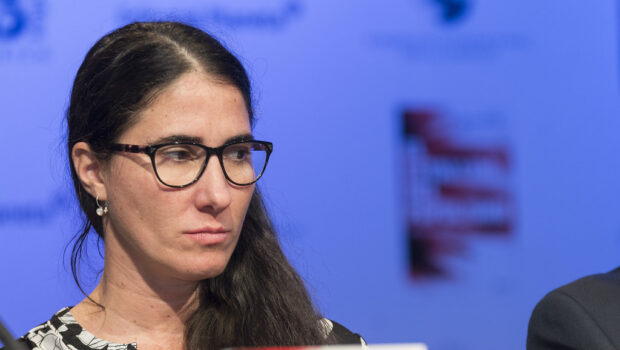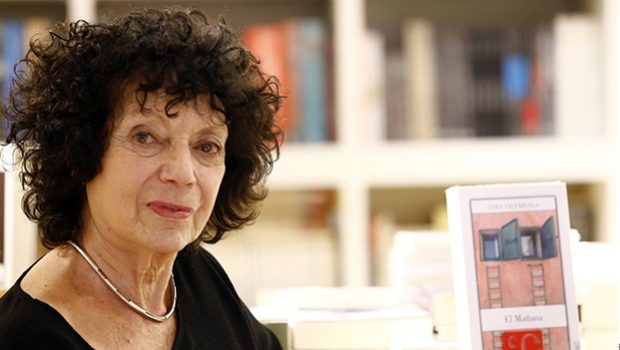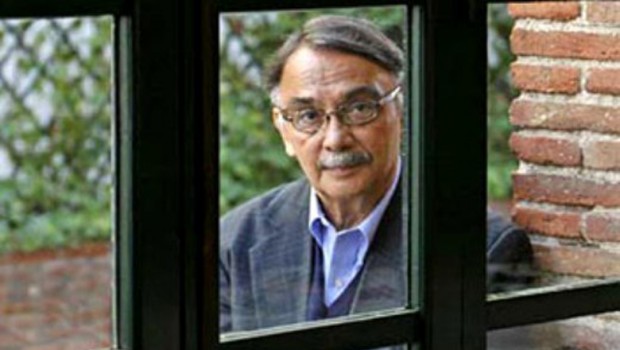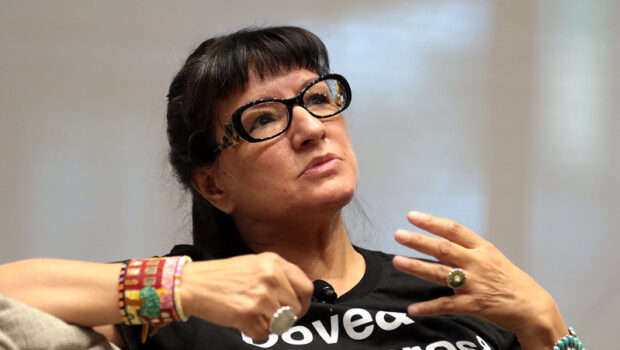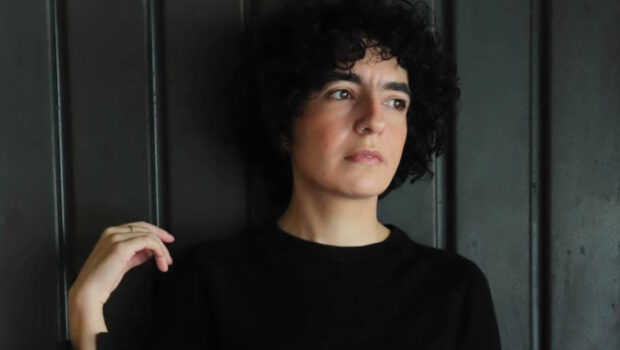Two Latin Pulitzer Awards
Junot Díaz, Óscar Hijuelos
Junot Díaz
Junot Díaz, winner of the 2008 Pulitzer Prize for Fiction for his novel, The Brief Wondrous Life of Oscar Wao (Riverhead Books/Penguin), Professor at MIT and current fiction editor for the Boston Review, and Oscar Hijuelos, the first Latin Pulitzer Prize-winning author for his fiction novel The Mambo Kings Play Songs of Love, who has recently published Dark Dude, his first book for younger readers (Atheneum/Simon & Schuster) were both interviewed exclusively by Literal after their lectures at the International Festival of Authors, which brings together the best writers of contemporary world literature every year in Toronto.
* * *
Why do you think Rafael Leónidas Trujillo’s life has attracted and appealed to so many writers and artists, including Mario Vargas Llosa, Julia Alvarez, Salma Hayek and you? Do you think that evil is a kind of inspirational muse for writers and artists?
Junot Díaz: México has the United States on one side, and below it several other countries, but an island is a completely different thing, and Santo Domingo is at the center of the Caribbean. It is in the midst of several countries but it is also at the center of what we call the Americas. It’s one of the most unknown islands. Many people know Haiti, Cuba, Puerto Rico, but Santo Domingo, what does that mean? Due to what Trujillo did and his character, is in some ways the Latino New World Dictator par excellance. There’s something about him as a symbol that represents so much about the new world experience, and I think that he is a really convenient metaphor.
In Oscar Wao’s character, pop and camp culture is very important: (comic-books, science fiction novels, and the American TV of the sixties). How important is pop-culture in Junot Diaz’s literary work?
J.D.: I’ve only written two books and there’s only been this book where pop-culture, la vaina de los nerds, takes up so much space. I’ve only written two books. We’ll see what I do for the next one, and then I’ll be able to answer that question a bit more intelligently. At the time, I had to use all the pop culture deal, that pop strategy to create this novel. I don’t know if I’ll use the same methodology next time. For this novel, it was very important, of course. It has been the pillar upon which I built the novel.
We found echoes of Manuel Puig’s in your work that established liaisons between The United States and Latin America through popular culture. What do you think about this?
J.D.: Sure, why not? Imagine if someone tells you that you’re Manuel Puig’s neighbor, you would say yes, of course. Why not? I must have a very good reputation. Of course, I know that crazy man’s work and I feel very proud that someone would see that in my own work. But what underlies this question is the notion that, for many of us, people who were raised in Latin America, when you ask us who we know from the United States, you see what who we know are pop people. When I talk to my cousins who stayed in Santo Domingo, what they know of United States culture is pop culture. It´s amazing. You can’t talk about American history or politics, but they can talk about Coldplay, the bands, the fashion and TV. It’s what Ariel Dorfman says: that the United States projects itself into the imagination of Latin America most powerfully through entertainment forms, whether it is music, movies or comic books.
We Mexicans, have “La chingada” as a cultural and historical curse. Do you think that the “fukú”, probably the main character of The Brief Wondrous Life of Oscar Wao, is “La chingada” “a la dominicana”?
J.D.: I think the book includes a very interesting claim in the footnote. What the book brings up is the historical difference between Mexico and Santo Domingo. The great female figure in Santo Domingo is Anacaona, a taína who preferred being hung and burnt alive to marrying a Spaniard. In Mexico there’s la Malinche, and I think that it’s no accident that Mexico has this one figure and that the Dominican Republic has also its own. Both of them are very convenient figures, but I think the reality of Latin America exists between Anacaona and La chingada. I honestly think that Mexico cannot understand itself without Anacaona as the Dominican Republic cannot understand itself without La chingada. Luckily, in Santo Domingo we already have a figure, and it’s male: the most famous nation-seller, another taíno for whom everything that was European was the best.
Do you think that in Junot Diaz there is a little of Oscar Wao’s biography? Is Oscar a kind of alter-ego? (Like Superman and Clark Kent)
J.D.: No. People want that. The question is how bad they want it. It’s so obvious in this book that the person who is my alter ego is Yunior. The fact that people want me to be a part of Oscar is more hilarious than anything because I spend the entire book basically saying “this guy is me” and if I was partially Oscar, that would be great, that would be wonderful, because I would be let off easy. The hard question would be, wow, are you as big an animal as Yunior is? Not as a part of you, a nerdy fat kid.
Are there any plans to make a movie based on your novel? If so, who would you like to play Oscar Wao, Lola and Belicia?
J.D.: The movie was bought by Scott Rudin and Miramax. Walter Salles, the Brazilian director is directing it. He is the one who directed Central Station and The Motorcycle Diaries. I have no idea who could play Oscar, Lola and Yunior. But I know who could play Trujillo and that’s going to be Oscar de la Renta. He’s fucking perfect. Have you ever seen a picture of Oscar de la Renta? He would be perfect as a dictator.
You were working on your Akira novel in Mexico City by invitation of Francisco Goldman, who happened to introduce you to Oscar Wao. Can you tell us about this first encounter and how did living in Mexico City inspired you to write the Oscar novel?
J.D.: I love Mexico City. It’s such a fucking mess and it’s so fucking beautiful. It’s the most extraordinary city in the world. Now, I can love it because I am privileged. I have an American passport and we should be clear: having an American passport in Mexico City is like being rich in Mexico City. So the rich and visitors love the place, but like I’ve said, it’s very screwed up. But as a city, the entirety of America is present. It’s like the Dominican Republic, it’s a perfect metaphor for the entire world. Mexico City is a perfect metaphor. When I was in Mexico City I fell in love so deeply with the city because I felt like I couldn’t decide whether I was simultaneously in the future, in the present or in the past. I would be buying a taquito and there could be a space man sitting next to an azteca sitting next to a rocker. That’s how it feels all the time. All this culture, all this poverty, all this corruption, all these dreams; you can’t help but to render it into your mind. It was just like living to the thousandth degree. So as an artist it was an incredible inspiration because, as a human, it’s an incredible challenge. Mexico City is a challenge to the human being. It is a challenge to remain human in Mexico City, and I loved that. I was coming to terms with this tremendous challenge, and I was trying to be an artist, too. I’ll never forget: I was hanging out with Frank Goldman who is the wildest, craziest guy. He is all night life and is super intellectual, so we would be talking books all day, we would go see artists, performances, we would go see plays, museums and we would get to know architects. The entire Latin American cultural scene finds its way to Mexico City, and we would go see underground artists, filmmakers… It was so fucking amazing and he was this brilliant guy, and I think in some ways, having this environment that was a 1000% creative, a 1000% challenging, a 1000% Latino is a direct reason this book is this way. The energy of this book comes from living in the city where one moment the taxi driver would rob you, or you get kidnapped for twelve hours so than they can get the same amount from an ATM at midnight. Where you can be sitting with a Mexican kid who spent the last twelve years in Paris and thinks he’s more French than Mexican. It’s such a joke, it’s so perfect.
And how did you meet Oscar?
J.D.: I didn’t meet Oscar. I was just one day at a Mexican party with all these Mexican artists hanging around and drinking, and you know how it is. If you are with an artist in Latin America, there’s always two or three either Anglo or American pals, and there was this Mexican kid I know who loved (loved) British Literature, or Anglo literature, I should say. He started talking to me in English. “Oh my god, el escritor favorito mío es Oscar Wao…”. He spoke in English. “My favorite writer is Oscar Wao” and when he said Oscar Wild, pronounced it Wao. I was laughing, practically shitting myself, and that very night I threw myself into bed and it was like lightning striking. I had an apartment in the Condesa, on Amsterdam, and I fell into bed at four in the morning, still laughin at that tiger that said Oscar Wao. In that moment, as I was laughing, came an image like lightning: That poor fucker, this nerd, his sister, mother and grandmother. They came in a flash, and at that point I had the novel. I don’t know where that guy came from, why he came out, but in a big shazaam when I said his name came this novel.
Do you have a work in progress on your desk?
J.D.: No, nothing yet. I’m very slow. I’m the only writer I know that takes ten years per novel. I have a very archaic rhythm, and I’m looking for the next shazaam.
***
Óscar Hijuelos
The two “Latino novels” that won the Pulitzer Prize, The Mambo Kings Play Songs of Love, and The Brief Wondrous Life of Oscar Wao have something in common. Both novels underline the frustrated adoption of the American dream of one particular group of Latin American Culture. Why do you think that the American readers are so interested in this kind of novels at this moment?
Óscar Hijuelos: There are twenty years between both novels, so I would say that every twenty years the American readers become interested in certain Latino stories. There’s Texan and Chicano writers like Rudy Anaya who has deserved attention for decades. Why the Dominican thing now? I don’t know. Trujillo is an old story, Batista is an old story. Maybe it’s because this is the time of Bush. He’s not a Trujillo, but almost. Maybe this is the time where the critical establishment is nostalgic for bringing light to Latino history, but I don’t think they do enough. There are so many beautiful Latino novels, short stories and plays but we are still on the outskirts. It’s been like that for twenty years. I’m accepted, but you almost have to win great prizes to be part of the club. Americans become periodically interested in certain themes regarding Latino writing literature, but I don’t think it’s something they live with every day.
The critics thought highly of The Mambo Kings as a novel. Nevertheless, the film had mixed reviews. The New Yorker, for example, described the movie as overpoweringly ersatz—The Cotton Club with a Cuban accent. Were you satisfied with the film interpretation of Arne Glimcher? What do you think about the Broadway version of your novel?
Ó.H.: I was happy that so many Latino actors were employed, but very few Cubans were in it, and for that matter a lot of the cast was Puerto Rican and from different Latin American nationalities. I was very happy that they were given the chance. Antonio Banderas and Armand Assante, who is Irish-Italian but very Latin-looking, were both great, but the script was loose and the humanity of the characters could have been brought out more. In Hollywood they have their own perception of Latinos. As for the Broadway version, it was a titanic. I don’t know how to put this politely, but too many gringos were involved and I don’t think the producers knew what they were doing, musically speaking. There were too many people who did not know what they were doing. We had the Mexican actor Jaime Camil, very good singer and with nice presence. We also had Esai Morales who is a New Yorker/Puerto Rican, but again, no Cubans. I’m not saying it has to be like that, but it gives it a distinctive flavor to the show. I don’t know what happed. It should have been in Broadway, but we were in San Francisco for six weeks and the crowds really loved the show, but the critics so resented the fact that there were a lot of outsiders, and so they killed it in the reviews. The producers got frightened and fired 75 kids, mostly Latinos, and that was the hardest thing for me, when they let them go. It was embarrassing, too. I lost three years on that, and that’s a long time, but it certainly had its moments. The music was good but to give you and idea of the prejudice society has towards Latinos: the composer was Carlos Franzetti, who has won three Grammys, and he divided his score with so many connotations and different rhythms and techniques and the reviewers didn’t know enough about Latino music to interpret what they were hearing so one review called it “lounge music” the kind of music anyone could play. It’s ignorance. It had a lot of things against it but I think, although it had the talent, the guidance wasn’t there. Was it prejudice? I don’t know.
The film The Mambo Kings caused some debate about the roots of Mambo in America. Who was the real “Mambo King”? Does Mambo develop in New York City or in Mexico with Dámaso Pérez Prado?
Ó.H.: You can’t say mambo originated somewhere in particular. Cuban musicians like Chico O’Farril did the orchestrations for Dámaso Pérez Prado in Mexico City when he moved from Havana. Pérez Prado also lived in Havana and he came to New York a lot. Musicians from New York and Havana went frequently to Mexico City back then, and the other way round. I would say it’s a hybrid. The musician’s world is very small and intermingled, and I don’t think there’s an original place, although I would say that Pérez Prado did the most popular rise at that time.
We found echoes of Guillermo Cabrera Infante’s in your work as a way to establish liaisons between The United States and Latin America through the Latino popular culture. Particularly, the last part of Cabrera Infante’s masterpiece (Three-Trapped- Tigers) called Ella cantaba boleros (She Used to Sing Boleros). Do you have Cabrera Infante’s influence? Did you meet Guillermo Cabrera Infante?
Ó.H.: We all have our influences and the Three- Trapped- Tigers was a wonderful book to me: very out-there and bold. I love his lucidness and the way he wrote. He loved mambo kings a lot, and I always considered him the master painter. We were friends for years, and once we spent the day looking for guitars in Madrid. What other honor could you have than looking for guitars with Cabrera Infante? He was a very talented and serious guy. He joked a lot but never smiled.
In your novel Dark Dude, you approach to the Cuban immigrant experience through a not-fully Latino, not-fully white kid who finds solace in comics rather than confronting the real world of the 60’s. What are the challenges for the cyber-teens of the new millennia? Does your novel carry out a message for the young?
Ó.H.: The challenge is to keep the focus on the work they have to do in order to survive. For me, the internet and the cyber-world is good if used sparingly— and kids love it—but they have to keep their focus on the future they want and not be distracted by all the excessive entertainment and time-wasting elements that can be found out there. People spend more time looking on ebay, jokes or porno. The world has changed so much but there is prejudice still, and it’s a coastal prejudice. Latinos from the east coast of the United States have a certain way of being and they are different from the west coast’s Latinos, where there are more immigrants from Mexico and more paranoia about the white men getting kicked out by gangs. Rico is just a kid trying to find himself in that world. When I was growing up I was “the whitey” in the house, and my Spanish was half-assed. Both my parents were darker and everyone around me was darker. And there I was, trying to find myself among other Latinos but not knowing how to fit in. Prejudice is so superficial, and I think the message is “you have to say—I don’t want to use dirty language here—leave me alone! Be proud of who you are and don’t sell out to the establishment”.
What plans do you have for the future? Do you have any “work in progress” on your desk?
Ó.H.: I’m doing a novel called Beautiful María de mi alma. It’s the song Néstor Castillo writes about a Cuban woman he left behind, and to me she was Cuba, the past. He comes to America, marries someone else but he always thinks about María and when I was writing The Mambo Kings it was about all the immigrants who come to a new country and, no matter what their situation, there’s always what they left behind, no matter how good it is here. To me, Cuba is a beautiful woman called María and I’m writing about her.
Posted: April 15, 2012 at 5:48 pm


